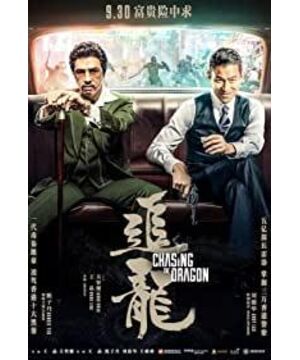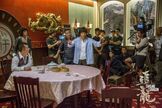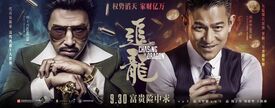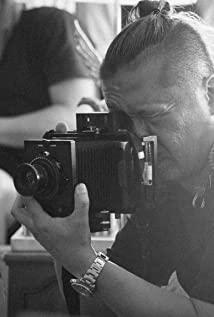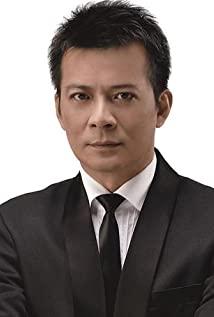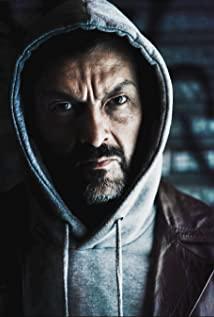Wu Xihao Wu
Xihao's legendary life began from Shek Kip Mei, located in Sham Shui Po, Kowloon, Hong Kong. Since the 1950s, the Hong Kong government has used it to settle immigrants who smuggled into Hong Kong from the mainland.
When he first arrived in Hong Kong, Wu Xihao made a living by gambling in the flower stalls in Shek Kip Mei, but soon he met strong competitors: the Ma brothers, the elder brother "white pink horse" Ma Xiru, and the younger brother "golden horse" Ma Xizhen.
Wu Xihao's competition with the Ma brothers was unfavorable, his career was declining, and he was desperate for money and power. He soon found a more profitable and exciting industry than the word flower: drug trafficking.
Brother Hao's drug trafficking career started from a fan stall. Like running a character flower, it was not smooth at the beginning. He also encountered a competitor: the Dongguan Gang, who were powerful in the Shek Kip Mei area at that time. While looking for stronger underworld forces to seek refuge, Wu Xihao organized manpower and Dongguan Gang to join forces. After a bloody and brutal fight, the Chaozhou Gang "Yiqun" led by Brother Hao won, and the business finally got on track.
At the same time, he met the most important woman in his life: Zheng Yueying. Although Zheng Yueying was a widow and had two children with her ex-husband, after marrying Wu Xihao, she married her husband and raised her son, and won the Wu Xihao brothers. of respect. Brother Hao can be said to be proud of both in the field of love and the battlefield, with a bumper harvest in both career and love, and his time has finally come.
Wu Xihao called brotherhood with the top police officers, while constantly expanding the drug sales network, making a strong case in the underground world of Hong Kong. From the late 1960s to the early 1970s, he sold more than 30 tons of drugs worth more than 300 million yuan. "Yiqun", together with Xinyi'an, ShishiK, and Heshenghe, were called the four major families of the underworld at that time, and their power was flourishing.
Wu Xihao not only had an affair with Hong Kong Chief China Inspector Lu Le, but the gang was also involved in several serious cases such as murder and silence. The most important thing is that his success has greatly damaged the interests of other drug organizations. In view of his "righteous group" "The man is strong and the horse is strong, and the opponent knows that Ming can't beat him, so he will use the most direct and effective method: send a killer to assassinate him. Although he survived the catastrophe and escaped the catastrophe, his left foot became disabled, and the name of the rivers and lakes has since become a "lame hero".
On February 15, 1974, the Hong Kong Independent Commission Against Corruption announced its establishment and began to vigorously crack down on corruption and crime.
On November 12, 1974, Wu Xihao was arrested and charged with drug trafficking after returning to Hong Kong from Taiwan. Those arrested at the same time included eight other people in the group. After nearly two years of trial, Wu Xihao was sentenced to 30 years in prison. Other defendants in the same case were sentenced to seven to 25 years in prison. The gang organization "Yi Qun" led by him was severely damaged by the arrest of many backbones, and it continued to decline. The number of people dropped from tens of thousands at the beginning to a few hundred in the 1980s and 1990s.
His wife, Zheng Yueying, was also arrested and sentenced to 16 years in prison on February 23, 1976, fined 1 million yuan, and released in 1992.
Before making Wu Xihao's story into the movie "The Lame Man", McDonald went to the prison to ask him for his opinion. He did not agree. classic gangster movie.
In August 1991, Wu Xihao was pardoned by then-Hong Kong Governor David Wilson for suffering from terminal liver cancer. Due to his serious illness, he was actually only transferred from the detention ward to the second-class ward. After 25 days of release, he died due to the deterioration of his condition.
The prototype character of Lei Luo is called Lu Le, known as Brother Le and Uncle. He and four wanted former detectives, Lan Gang, Han Sen and Yan Xiong, are also called "Four Detectives". The head of the chief is known as "500 million detectives". Among the four detectives, Han Sen has to rely on him for promotion. Yan Xiong is a mess with him, and only Lan Gang can be compared with him.
Lu Le
Lu Le was born in Haifeng, Shanwei City, Guangdong in 1920. He was originally a fisherman. When he first arrived in Hong Kong, he made a living by shining shoes, delivering newspapers and pulling rickshaws.
On November 9, 1940, Lu Le joined the Hong Kong Police Force. In the beginning, he was a police officer in the uniformed patrol team. He was later transferred to a detective. He was later appreciated and supported by senior detective Chen Li. In 1951, he was promoted from detective to detective. At the same time, he was transferred to Sham Shui Po Police Station. He was promoted to Senior Exploration in 1956.
According to legend, the head of Xinyi'an was Lu Le's uncle at that time, so Lu Le was both black and white. The gangsters such as Xinyi'an, Yiqun, 14K and He Shenghe all gave him face, and the big drug lord Wu Xihao also wanted to see his face. Acting, whenever there is a case to be handled, he does not need to take action himself, as long as he speaks to the leader of the gang, it will be done.
In 1956, the Double Ten riots launched by the rightists took place in Hong Kong. Because Lu Le is very familiar with gangster organizations and people such as 14K and New Ngee Ann, he performed very well and received high attention and reuse. He was promoted to New Territories District Inspector and stationed at Tsuen Wan Police Station.
In 1958, Lu Le was transferred to Yau Ma Tei Police Station to take over from Liu Fu, who was retired. On April 1, 1962, Lu Le and Sham Shui Po Police Station Inspector Lan Gang were promoted to Chief China Inspector. They are stationed in Kowloon and the New Territories.
After becoming Inspector General of Zonghua, Lu Le can be described as one-handed and invincible. He divided the pornography, gambling, drug, usury and loan sharks within his jurisdiction into a unified area and operated it as a company.
A steady stream of money flowed into Lu Le’s pockets. At that time, it was rumored that Lu Le’s net worth was at least 500 million. In order to cover up the huge wealth of unknown origin, Lu Le purchased properties in many places in Hong Kong in the name of his parents from 1959 to 1968, and then went back to 1968. In the name of his son, he established Weibin Real Estate Co., Ltd. and invested in an international restaurant located on Nathan Road. The restaurant was very successful and later became a listed company: Emperor International.
In 1967, in order to suppress rampant corruption, the police switched the jurisdictions of Lu Le and Lan Gang. The following year, Lu Le retired early and immigrated to Canada with his wife and eight children in 1973.
After the establishment of the Independent Commission Against Corruption in 1974, Lu Le became the biggest target of pursuit due to his wealth of HK$500 million and his disproportionate wealth and official position. In 1979, Lu Le bought a mansion in Taipei, Taiwan, and has lived in Taipei for a long time. For more than 30 years, he also traveled to and from Canada. On May 13, 2010, Lu Leyu died of terminal gastric cancer in Canada at the age of 89.
Even though the Independent Commission Against Corruption had been established as early as 1974 and wanted Lu Le, it was still unable to extradite him back to Hong Kong. Buried in Vancouver, Canada.
View more about Chasing the Dragon reviews


